On Saturday, Oct. 5, 15 marching bands from across Central Virginia will congregate at Lynchburg City Stadium for the 50th annual Lynchburg Classic competition. Hosted by E. C. Glass and Heritage high schools, it’s one of the longest-running marching band contests in the Commonwealth.
The Classic has long been an iconic fixture in the marching band community, historically bringing in schools from across Virginia and even North Carolina and Tennessee. Renowned for its stellar organization, prestigious judges, and position as a leader in state marching arts contests, the competition has long outlasted many others in its sphere.
Each year, 15-20 bands battle for dominance in size-based scoring classes, performing meticulously-rehearsed pieces before a crowd of at least two and a half thousand spectators. The evening culminates in an exhibit-only performance by E. C. Glass and Heritage high school students right before results are announced. The band receiving the highest score from the panel of professional judges takes home the title of grand champion.
“The Classic is a chance to showcase what our schools can do when we come together. It’s a historic competition that has outlasted generations of students over the past 50 years,” said Heritage High band director Earl Brooks. “Its longevity and reputation in the community speak to the professionalism of our bands.”
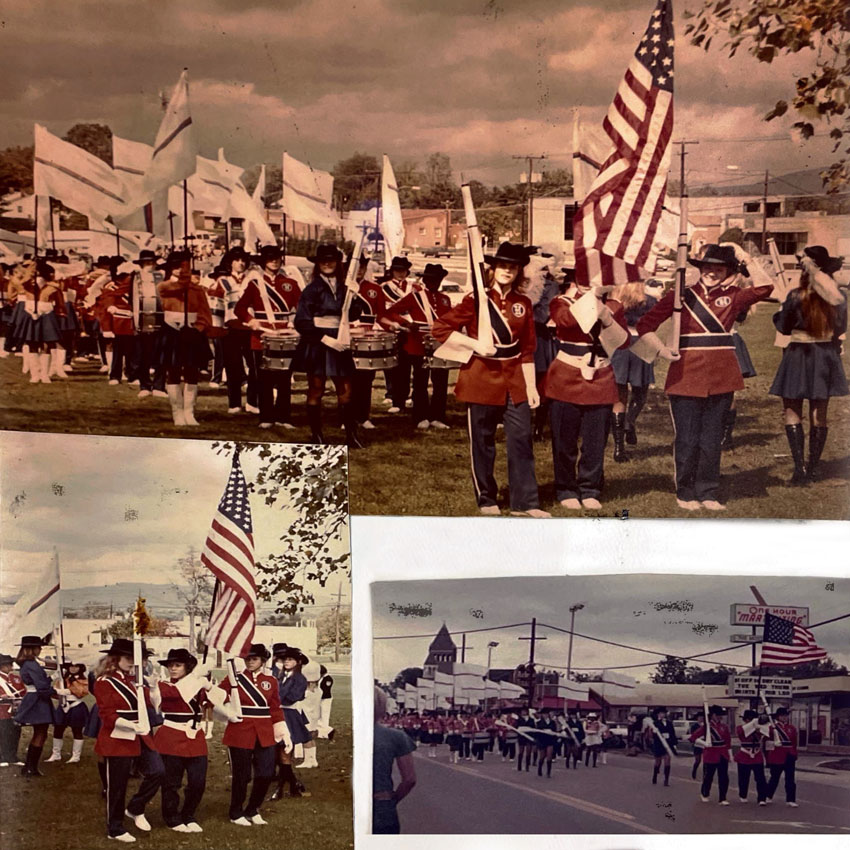
Photos from the second annual Lynchburg Classic Parade of Champions.
The Classic’s Enduring Legacy
When it first launched, the competition was called the “Lynchburg Classic Parade of Champions.” Bands kicked off the event with a parade on Memorial Avenue, filling the streets with music and enticing spectators to come see their performances at the stadium later in the day.
“The Classic was the dream of Neal Haworth when he was the band director at E. C. Glass. We were one of the first competitions in the state. Today, there are scores of marching band competitions in Virginia,” said Jim Meredith, who served as an LCS band director and teacher for 40 years before retiring in 2013.
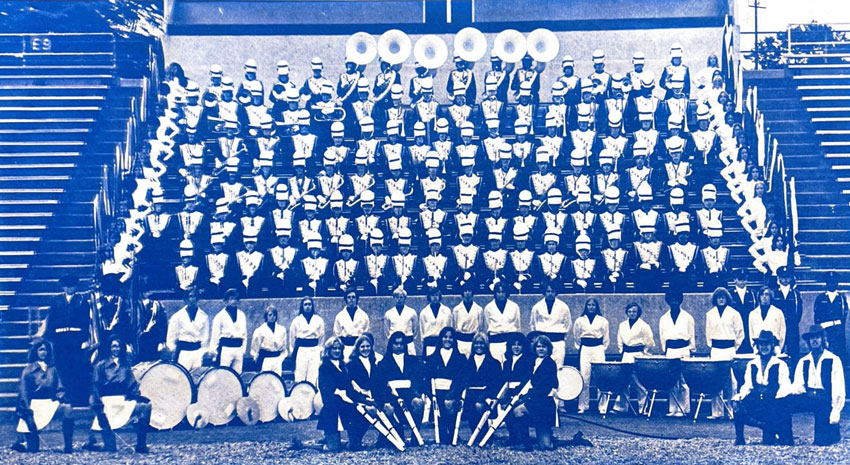
The E. C. Glass marching band, as featured in the program for 1976 Lynchburg Classic.
Meredith, who remains a leader in the local music community and conducts the Lynchburg Pops Community Band, will be a judge at the Lynchburg Classic this year. He’s been involved in nearly every single Lynchburg Classic since the first one. Meredith judged the Classic multiple times after retirement and helped organize it every year of his career at LCS, during which he directed bands at Sandusky and Dunbar middle schools as well as E. C. Glass and Heritage high schools.
“I think it’s an important legacy for this community to have this thriving competition, which is so respected in the world of music education,” Meredith said.
Haworth passed away in 2022, but his legacy lives on through the Lynchburg Classic. Meredith, who considered him a mentor and friend, hopes the 50th anniversary of the Lynchburg Classic would make Haworth proud.
Though much has changed since Haworth hosted the first Lynchburg Classic, its spirit and reputation for excellence have remained constant. Fifty years later, the Classic invites participants and spectators alike to reflect on the city’s rich history as a hub for artistic expression.
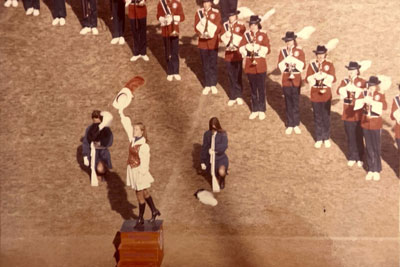
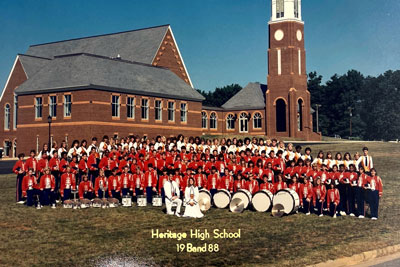
Historic photos of the Heritage High School marching band, also known as the “Big Orange Marching Machine.”
Marching Through Generations
For Heritage High band director Earl Brooks, the Classic represents a love for the marching arts that spans generations. He knows directors across the region by name, and many tell him about their history with the competition.
“Many of the area directors marched in the Classic in high school. It’s been around for so long that they’re returning as band directors to bring their own students the same quality competition experience they had growing up,” Brooks said.
This year is especially symbolic for Brooks, bringing the opportunity to work alongside his longtime mentor Doug Brown, the band director at E. C. Glass. Brooks began his career as a student teacher under Brown at Linkhorne Middle, and the chance to host the competition with him feels especially meaningful.
“I competed in the Classic three times in high school. I never imagined I’d be running the competition in the future,” Brooks said. “If you’d told me when I was student teaching that Doug and I would be working together as the head band directors at the high schools, I’d have found that hard to believe.”
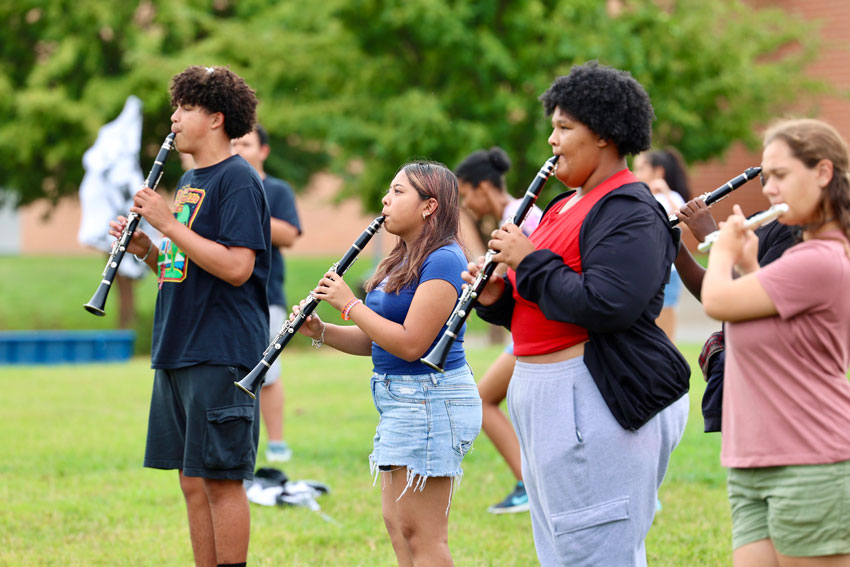
The Heritage High marching band practices for the Classic.
Brown also competed in the Lynchburg Classic four times as a student at Brookville High School. He helped facilitate the competition behind the scenes on many occasions during his tenure directing the bands at Linkhorne Middle School and Heritage High. Now, in his first year as the band director at E. C. Glass, he’s playing a pivotal role in organizing the event. The Classic has been a constant over the course of his 17-year teaching career, reminding him of his love for the marching arts and the teachers from his past who inspired him to dedicate his life to music.
“I knew I was going to be a band director before I ever set foot in a band classroom. All my older siblings did band, and I tagged along at their performances and activities. I fell in love with band. Countless teachers inspired me over the years to pursue music as a career,” Brown said.
Today, Brown leads the band at E. C. Glass alongside his own former students. It’s one of his favorite parts of the job: Seeing people he’s taught pursuing their love for music and investing in the next generation of students like the teachers who came before them. It’s an endless cycle of inspiration and care that keeps music education alive across the decades.
“It’s surreal to think that my staff is made up of former students. It’s fulfilling to see the love of music I’ve helped instill in young people,” Brown said.
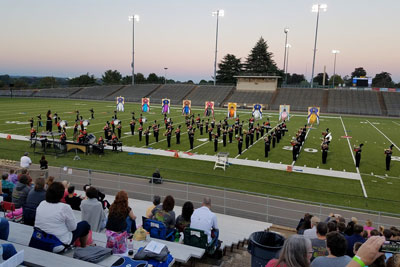
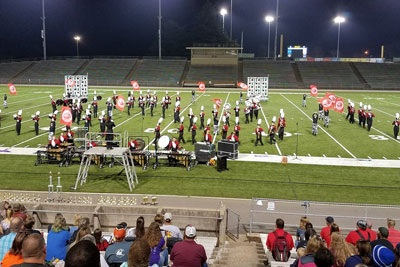
Bands compete at the 2017 Lynchburg Classic.
For the Love of Music
It’s this same love of music that unites E. C. Glass and Heritage high schools as they work together to host the Classic each year. Band directors, teachers, parents, and students begin preparing months in advance to ensure the event is a success.
“It’s a great opportunity for parents, teachers, and students from both schools to come together and create something for the betterment of the marching bands,” said Stacy Taylor, the president of the E. C. Glass band booster organization, which works with its counterpart at Heritage High to make the Classic possible each year.
In athletics and other competitive ventures, the two schools are rivals, but there’s a distinct spirit of camaraderie between them when it comes to band. While it’s unusual for two schools to jointly host a marching band competition, their culture of mutual support is the secret to the Classic’s longevity.
“It’s a joint effort that allows for Heritage and E. C. Glass to come together as one. The students run the competition, and it’s an exhausting day, but it’s also a rewarding day of team building,” said Heritage High booster president JaVera Bolden.
The marching band students are instrumental in making the competition a success. They guide visiting bands through the warmup and performance process to ensure they’re in the right places at the right time, spearhead the ticketing process, run the concessions stands and water stations, assist with advertising before the event, and more.
It’s an exercise in teamwork and leadership as well as a peek behind the curtain at how competitions are hosted. Each band typically participates in five to six competitions per season, hosted by other schools. The Classic helps them appreciate the hard work and planning that goes on behind the scenes.
“As the hosts, we’re able to show hospitality to other schools. We get to cheer them on and give them a good experience,” said E. C. Glass twelfth grader Abby Carpenter, who serves as the marching band’s drum major.
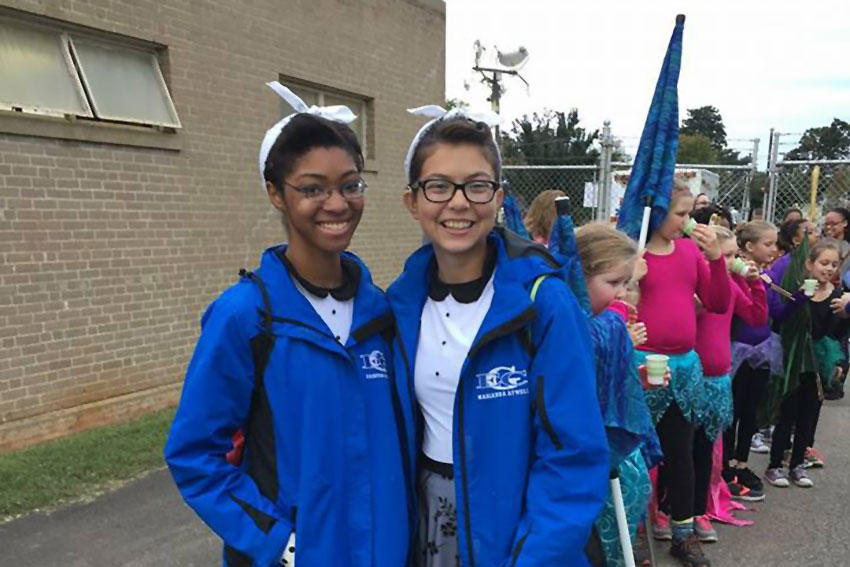
E. C. Glass color guard students guide T. C. Miller Elementary School color guard students, who performed at the 2015 Lynchburg Classic.
Students who have participated in competitions before know firsthand the value of these contests. While participating students perform, judges voice-record their critiques in real time for the bands to review afterwards, providing a wealth of constructive feedback that helps bands zero in on how to make their pieces even stronger for their next performance. The experience of competing develops students’ musicianship skills in addition to teaching them valuable lessons about leadership, collaboration, and discipline.
“The judges have been doing this longer than most of us have been alive. The smallest critique from them can boost us by so much. It’s so useful to hear an outside opinion on what you can change and how to make your performance better. You can learn a lot from it,” said Heritage High eleventh grader Desmond Coleman, who has helped run the Classic for the past three years.
Though students from the hosting schools don’t enter the running, they have the honor of ending the night with their own performances right before the scores are announced. Even without the thrill of competing, the Classic is rewarding for E. C. Glass and Heritage high school students, who take pride in delivering a high-quality experience to participating schools.
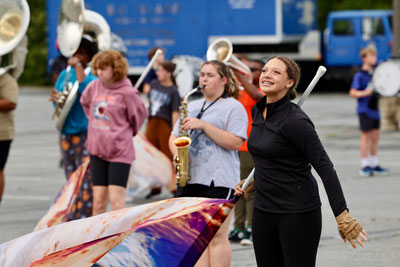
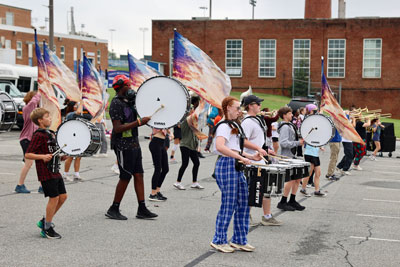
The E. C. Glass marching band practices for the Classic.
A Culture of Collaboration
The Classic isn’t the only chance the schools get to work together. The LCS Combined Indoor Drumline is composed of students from both high schools and all three middle schools. Some play together in the all-district band ensemble, and there are chances for students to intersect at competitions–though band directors coordinate to avoid pitting the two schools against each other at competitions whenever possible.
“The directors have always fought for unity between the teams. We’re all in this together, and we want to create a culture of togetherness between the two schools,” Brown said.
As a result, friendships between E. C. Glass and Heritage high school band students are common. And since sixth through eighth graders can audition for high school marching bands at LCS, there are even some middle schoolers in the mix–a testament to the diversity and acceptance that are emblematic of marching band culture. In general, band students are quick to befriend each other, even across school lines.
“The bands are always cheering each other on and encouraging one another. They genuinely want everybody to succeed and do the best they can. They’re motivated by a genuine love for each other and for other people,” Bolden said.
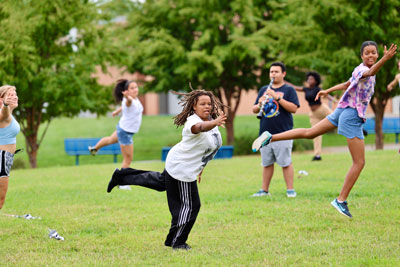
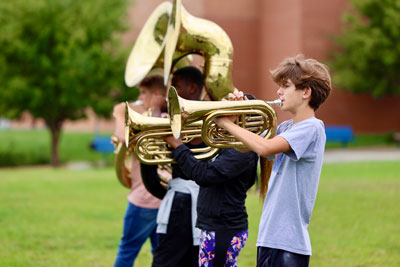
The Heritage High marching band practices for the Classic.
Brooks attributes the harmonious culture of marching band to the collaborative and equalizing nature of the activity itself.
“In a culture that’s very individualistic, we are not. We put on uniforms to make us all look the same. We do things collectively. We have to work through obstacles together in order to put on a marching band show,” Brooks said.
Marching band is a complicated dance of moving parts; musicians must perform choreographed moves in sync, play their instruments in perfect coordination with their teammates, and follow the lead of their drum major. For Brown, the high level of synchronization required from every member of the band provides the perfect opportunity for students to learn teamwork skills.
“Marching band is the ultimate team activity. As much as I love sports, there’s always a bench. But in marching band, every single one of us is always on, all the time. We are only as good as our weakest link,” Brown said. “It’s a chance for people of different backgrounds to come together and put a single product out on the field.”
Working together day in and day out through long rehearsals, football games, performances, and competitions, students form friendships that will last a lifetime. Bolden has witnessed the effects of the marching band’s spirit of teamwork firsthand.
“Band saved my kid, and I mean that with everything in my being,” Bolden said. “The teachers and the kids in marching band are a family. They welcome you as you are, and they don’t judge or expect you to be someone you’re not. Band helps students find themselves and see how much they’re worth and what they have to offer.”
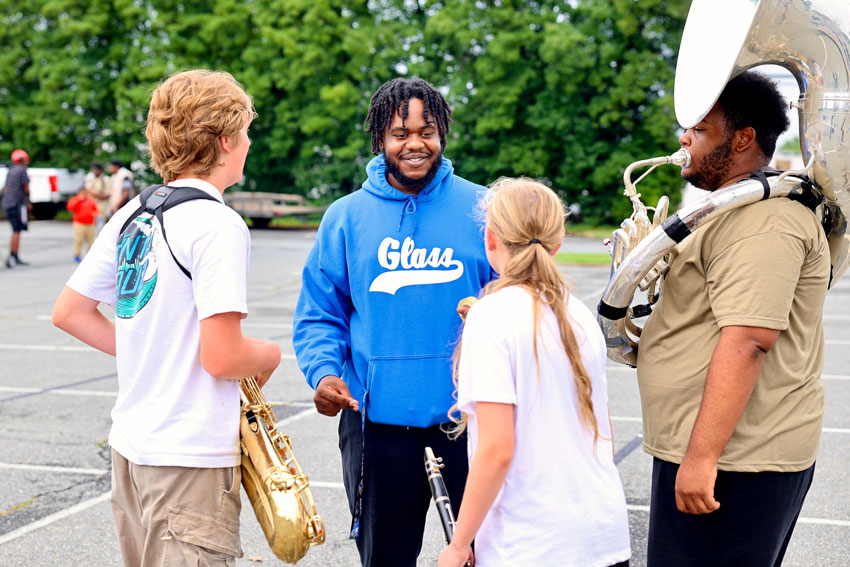
The friendships marching band students form with staff and fellow students can last a lifetime.
Experience the Time-Honored Tradition
The 50th Lynchburg Classic brings an opportunity to reflect on the impact it’s had on countless students, teachers, and community members over the years. For many, it’s more than a competition; it’s a love letter to the marching arts and a beacon of optimism for tomorrow.
“People criticize the youth of today, but the Lynchburg Classic is proof of how awesome these students are. If you come to the competition, you’ll see young people coming together to create great things. It gives me hope for the future,” Brown said.
Experience the time-honored tradition for yourself: Come to the 50th Lynchburg Classic marching band competition on Saturday, Oct. 5 from 12-7:30 p.m. at Lynchburg City Stadium (3180 Fort Ave.). You’ll see competition performances from 15 competing bands from across the state throughout the day as well as exhibit-only performances by the E. C. Glass and Heritage high school bands in the evening. Plus, both LCS high schools and all three middle schools will jointly perform the National Anthem to kick off the event.
Tickets are $10 for adults, $5 for students, and free for infants at the door. Cash and card will be accepted. All proceeds from concession and ticket sales will help support the E. C. Glass and Heritage high school band programs.

